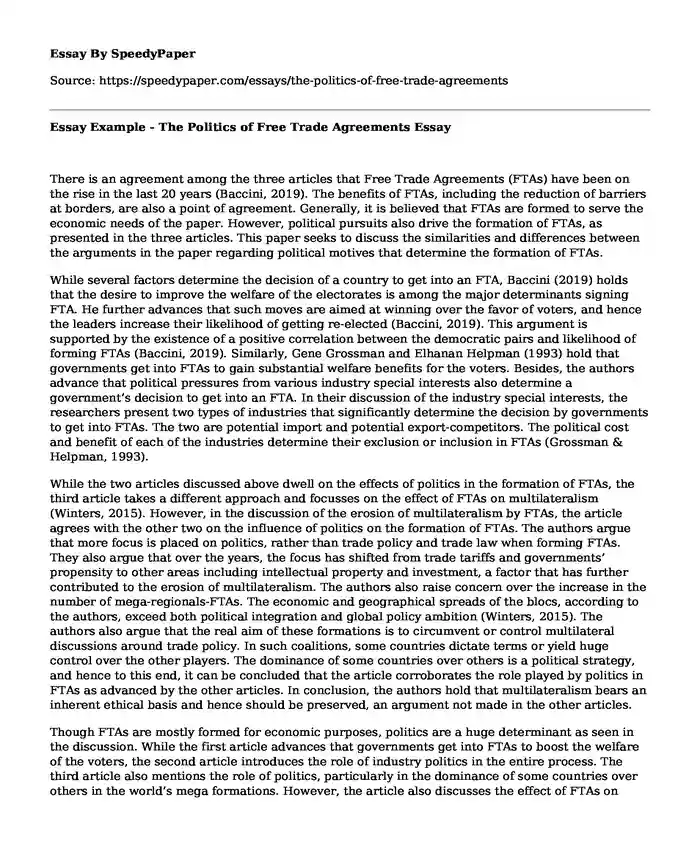
| Type of paper: | Essay |
| Categories: | Politics Marketing International relations International business |
| Pages: | 3 |
| Wordcount: | 670 words |
There is an agreement among the three articles that Free Trade Agreements (FTAs) have been on the rise in the last 20 years (Baccini, 2019). The benefits of FTAs, including the reduction of barriers at borders, are also a point of agreement. Generally, it is believed that FTAs are formed to serve the economic needs of the paper. However, political pursuits also drive the formation of FTAs, as presented in the three articles. This paper seeks to discuss the similarities and differences between the arguments in the paper regarding political motives that determine the formation of FTAs.
While several factors determine the decision of a country to get into an FTA, Baccini (2019) holds that the desire to improve the welfare of the electorates is among the major determinants signing FTA. He further advances that such moves are aimed at winning over the favor of voters, and hence the leaders increase their likelihood of getting re-elected (Baccini, 2019). This argument is supported by the existence of a positive correlation between the democratic pairs and likelihood of forming FTAs (Baccini, 2019). Similarly, Gene Grossman and Elhanan Helpman (1993) hold that governments get into FTAs to gain substantial welfare benefits for the voters. Besides, the authors advance that political pressures from various industry special interests also determine a government’s decision to get into an FTA. In their discussion of the industry special interests, the researchers present two types of industries that significantly determine the decision by governments to get into FTAs. The two are potential import and potential export-competitors. The political cost and benefit of each of the industries determine their exclusion or inclusion in FTAs (Grossman & Helpman, 1993).
While the two articles discussed above dwell on the effects of politics in the formation of FTAs, the third article takes a different approach and focusses on the effect of FTAs on multilateralism (Winters, 2015). However, in the discussion of the erosion of multilateralism by FTAs, the article agrees with the other two on the influence of politics on the formation of FTAs. The authors argue that more focus is placed on politics, rather than trade policy and trade law when forming FTAs. They also argue that over the years, the focus has shifted from trade tariffs and governments’ propensity to other areas including intellectual property and investment, a factor that has further contributed to the erosion of multilateralism. The authors also raise concern over the increase in the number of mega-regionals-FTAs. The economic and geographical spreads of the blocs, according to the authors, exceed both political integration and global policy ambition (Winters, 2015). The authors also argue that the real aim of these formations is to circumvent or control multilateral discussions around trade policy. In such coalitions, some countries dictate terms or yield huge control over the other players. The dominance of some countries over others is a political strategy, and hence to this end, it can be concluded that the article corroborates the role played by politics in FTAs as advanced by the other articles. In conclusion, the authors hold that multilateralism bears an inherent ethical basis and hence should be preserved, an argument not made in the other articles.
Though FTAs are mostly formed for economic purposes, politics are a huge determinant as seen in the discussion. While the first article advances that governments get into FTAs to boost the welfare of the voters, the second article introduces the role of industry politics in the entire process. The third article also mentions the role of politics, particularly in the dominance of some countries over others in the world’s mega formations. However, the article also discusses the effect of FTAs on multilateralism, an issue not discussed in the other articles.
References
Baccini, L. (2019). The economics and politics of preferential trade agreements. Annual Review of Political Science, 22, 75-92. Retrieved from https://www.annualreviews.org/doi/abs/10.1146/annurev-polisci-050317-070708
Grossman, G. M., & Helpman, E. (1993). The politics of free trade agreements. NBER Working Paper.
Winters, L. A. (2015). The WTO and Regional Trading Agreements: EUI Working Paper.
Cite this page
Essay Example - The Politics of Free Trade Agreements. (2023, Aug 22). Retrieved from https://speedypaper.com/essays/the-politics-of-free-trade-agreements
Request Removal
If you are the original author of this essay and no longer wish to have it published on the SpeedyPaper website, please click below to request its removal:
- To ID or Not To ID by Cal Thomas, Free Essay Analysis
- Cultural Diversity Scenario in Education, Free Essay Sample
- Fighting Terrorism in Afghanistan, Free Essay Sample
- Essay Sample on Entry Into a New Market
- Correctional Management: Gaining Skills to Manage Facilities & Assuring Career Success - Essay Sample
- Free Essay: Handmaid's Tale /2017/Hulu/ Season 1/Episode 1: Offred
- Report Example on Ethical Crossroads: Exploring Business Ethics and Leadership Challenges
Popular categories




